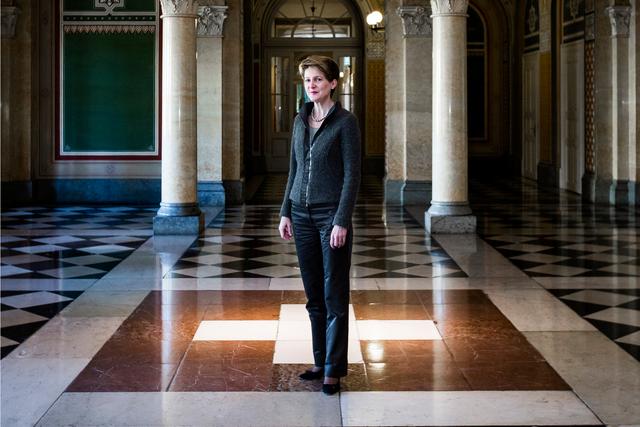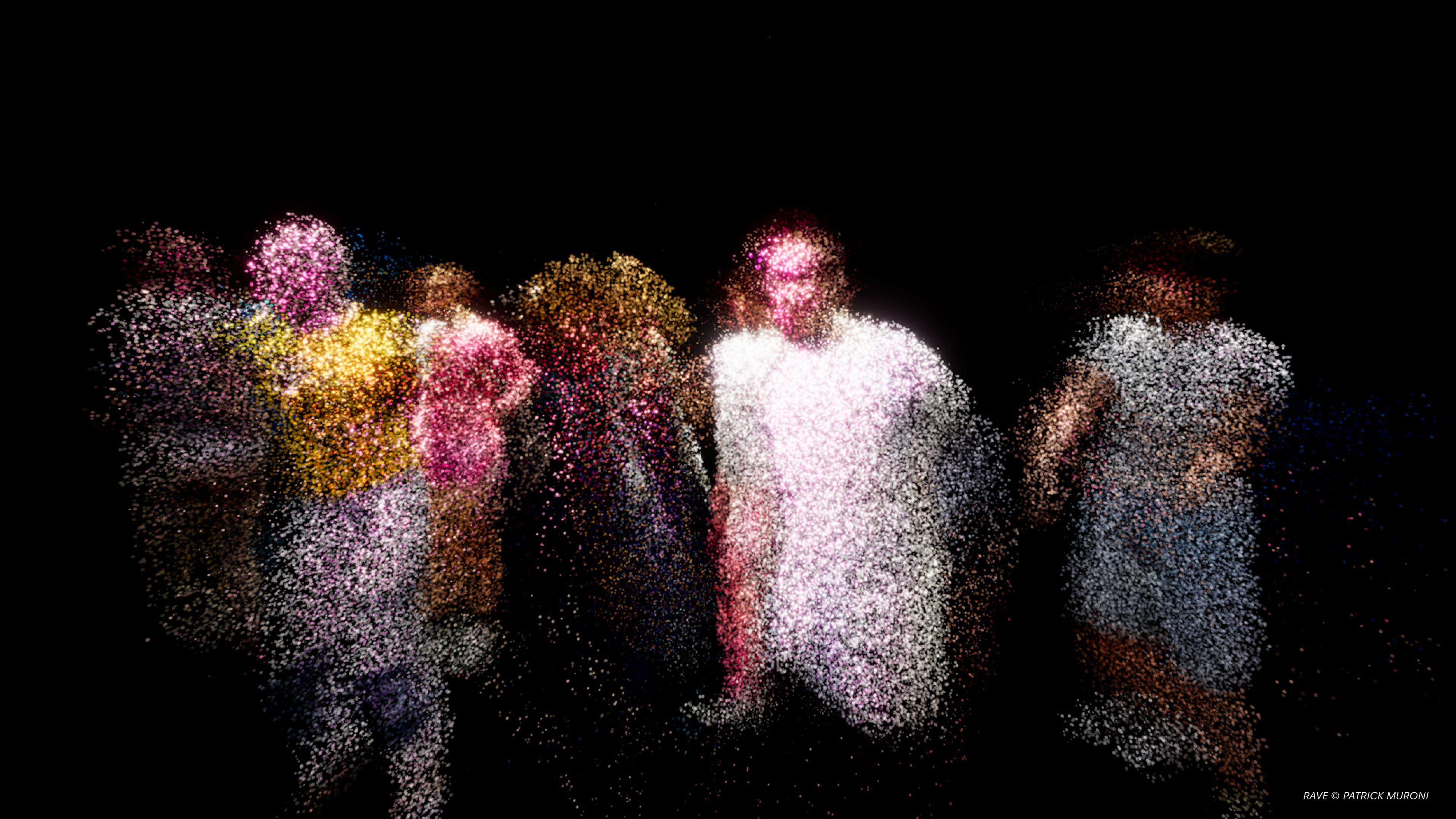
High-stakes year ahead for Switzerland’s new president

Reconciling the will of the people with national law and Switzerland’s international commitments will be the most delicate task for Simonetta Sommaruga, who has been elected to the rotating position of Swiss president for 2015.
The 54-year-old Social Democrat received 181 votes out of a total of 210 in Wednesday’s parliamentary vote in Bern – considered an excellent result.
Another item on Sommaruga’s to-do list next year is coming up with a way of implementing the initiative to limit European Union immigration.
She was elected to Switzerland’s seven-person cabinet in 2010 and was given the justice and police ministry – considered by some a second-class portfolio (these are allotted on a principle of seniority, with ministers who have been in cabinet the longest getting first pick). This infuriated those on the political left who, for the first time in decades, found themselves unrepresented at the head of any of the “key” ministries.
With her conciliatory attitude, she has tried to minimise the “low blow” dealt to her party and to reassess the importance of her department.
“I harbour a strong sense of justice, and this office will enable me to look after the rights of the weakest [members of society] and those who need greater protection,” she said, pointing to minorities, women who had been discriminated or abused, children of divorced parents, asylum seekers and victims of people trafficking.
In this area the justice minister has had her hands full since entering the cabinet, launching many proposals, draft laws and round tables.
Just last week she persuaded the government to support a draft law calling for the introduction of a quota of 30% women on the board of directors of all publicly-listed Swiss companies. Another would enable unmarried couples and gays to adopt their partner’s children.
Burning issue
But a large chunk of her first time as president – it’s possible to hold the rotating office more than once if you stay in the cabinet for long enough – will be spent dealing with the “rights of the majority”, in other words what voters approve in federal referendums or initiatives.
Indeed, Sommaruga faces the delicate task of finding compromises for various important issues which have been recently approved but which clash with national law or international treaties or agreements signed by Switzerland.
This is the case, first of all, of the initiative put forward by the rightwing Swiss People’s Party to put a limit on EU immigration. This was approved by 50.3% of voters in February but, for the EU, it clearly violates the free movement of people – a central EU tenet – and could result in a cancellation of the current bilateral treaties.
Given the stakes – the future of relations with Switzerland’s main trade partner – Sommaruga finds herself holding what will probably be the hottest dossier of 2015, an election year.
The head of the justice and police ministry, who says she values the sharing of ideas and consensus politics, will have to square the circle of direct democracy on the one hand and EU commitments on the other.
To this end, she will be able to benefit from her year as president to increase the number of meetings with European leaders – already on the agenda is a visit by French President François Hollande to Switzerland next year.
Primacy of Swiss law
Also on her desk is the equally tricky dossier concerning the deportation of foreigners who commit crimes – also the result of a People’s Party initiative which was approved by 53% of voters in 2010.
According to the text of the initiative, foreigners who commit serious crimes – and some lesser offences such as burglary – lose the right to stay in Switzerland and must be sent back to their country of origin.
Parliament is still split on how to implement this initiative, which, according to several experts, clashes not only with agreements signed with the EU but also the European Convention on Human Rights.
In order to increase pressure on the government, the People’s Party has already announced a new initiative, which would decree the primacy of Swiss law over international law.
Sommaruga will also have to tackle the initiative to ban convicted paedophiles from working with children for life, which was backed by 63.5% of voters in May despite government opposition.
Implementing this will also involve a dilemma: either parliament sticks to the wording of the initiative and violates the principle of proportionality – one of the pillars of the rule of law – or it veers away from the text approved by voters and runs counter to the original meaning of the initiative.
Asylum challenges
In addition, the new president will not be able to ignore reforming the asylum law. Her first project, presented in 2012, aimed to speed up the asylum procedure and to house applicants in centres run by the federal authorities instead of in accommodation in the cantons.
However, little remains of this project: the centre-right majority transformed it into a new package of measures, destined to worsen the asylum law.
In September this year, Sommaruga had another go with new proposals aimed at making the procedure quicker and cheaper: cutting the time needed to process requests to 140 days in most cases. But the problem would remain of repatriating rejected asylum seekers or sending them back to the European country where they first applied for asylum.
Last month Bern and Rome reached a new agreement, according to which Italy said it would guarantee appropriate accommodation for asylum seekers. Nevertheless, the range of the agreement with Italy, where most asylum seekers enter the EU, remains uncertain.
Unusual cabinet minister
Called upon for her legal shrewdness, Sommaruga isn’t a lawyer like most of her predecessors and doesn’t even have a university degree.
She trained as a pianist at the Lucerne Academy of Music and got into politics via a women’s shelter in Fribourg. She then became very popular protecting the rights of consumers.
She is reserved but also extremely skilful, pragmatic and tenacious – to the point of earning respect and praise even from her political adversaries. One of her main qualities is listening to other people. “I learnt that from music,” she explained.
She will need to do that to cope with the difficult challenges that await her next year.
Simonetta Sommaruga
Sommaruga was born in Zug in 1960. She grew up in canton Aargau. She attended the Lucerne Academy of Music where she studied to become a concert pianist and continued her education at the Fribourg Academy of Music.
She was manager of the Swiss Consumer Protection Foundation from 1993 to 1999 and its president from 2000 to 2010. She joined the centre-left Social Democratic Party in 1986 and in 2001 signed a petition calling for a more liberal party line, provoking sharp reactions from those on the left wing of the party and unions.
In 1999 she was elected to the House of Representatives and four years later to the Senate. In 2010 she entered the cabinet as justice minister. She is married to the writer Lukas Hartmann.
Three Social Democrats as presidents
In 2015, for the first time, the three chambers of the Swiss parliament will be presided over by members of the Social Democratic Party. Simonetta Sommaruga will be president of the Confederation, Stéphane Rossini will be president of the House of Representatives and Claude Hêche will be president of the Senate.
(Translated from Italian by Thomas Stephens)

In compliance with the JTI standards
More: SWI swissinfo.ch certified by the Journalism Trust Initiative





























You can find an overview of ongoing debates with our journalists here . Please join us!
If you want to start a conversation about a topic raised in this article or want to report factual errors, email us at english@swissinfo.ch.